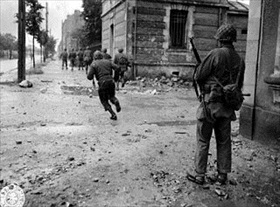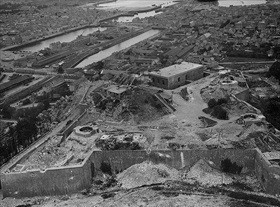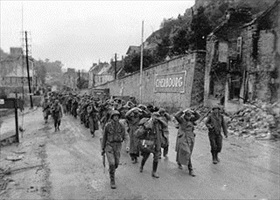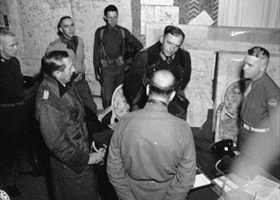CHERBOURG’S CAPTURE TO REPLACE LOST MULBERRY
Cherbourg, France · June 26, 1944
On June 19–21, 1944, a violent gale hit the two huge Mulberry artificial harbors that the Allies had built in England, towed across the English Channel under danger of wind, weather, and enemy air attack, and planted off the Normandy beaches on D‑Day-plus eight (June 14). The prefabricated harbors with their sheltered waters and their pontoon-supported ramps to the beaches were intended to deliver greater supplies of men, armor, vehicles, and munitions than landing craft could. Indeed, in just five days between June 14 and 18 the Mulberry harbor off Omaha Beach had moved a daily average of over 8,500 tons of cargo ashore. Planners appeared correct in their conviction that the artificial harbors were essential for the success of Operation Overlord.
The June 1944 gale, the worst to hit the Channel in forty years, inflicted losses greater than the enemy had been able to exact on the Allies: 800 ships were sunk or beached and more than 140,000 tons of supplies destroyed. The setback was colossal. GIs were down to two days of ammunition. The nearest replacement harbor, Cherbourg, at the tip of the Cotentin Peninsula, was 25 miles from Utah Beach and firmly in German hands.
On this date in 1944 U.S. infantry divisions, aided by P‑47 dive-bombers, captured the bastion that dominated Cherbourg and its harbor, Fort du Roule. The city’s 21,000‑man garrison under Lt. Gen. Karl-Wilhelm von Schlieben, some of whom were Polish and Russian “volunteers” (actually former POWs in German uniforms), surrendered piecemeal due to communications breakdowns between Wehrmacht (German armed forces) units. Allied mopping-up operations on nearby Cap de la Hague Peninsula were completed by July 1, which was also the last day the enemy could conceivably have reversed their sagging fortunes in Normandy.
The Allied victory was tempered by the discovery that the deep-water harbor of Cherbourg, suddenly so critical to sustain and reinforce Allied forces in Normandy, had been systematically wrecked by German engineers starting on June 7, the day after D‑Day. The main harbor basins were not cleared until September 21, causing a logjam of materiel and vehicles and a shortage of fuel that forced the Allied advance eastward to sputter out near the German frontier. Von Schlieben’s efficient demolition of Cherbourg’s harbor bought the Third Reich just three extra months before Germany’s apocalyptic collapse in April and May 1945.
![]()
The Fall of Cherbourg, France, Late June 1944
 |  |
Left: U.S. soldiers dodge enemy fire on Cherbourg’s battle-ravaged streets. Hitler had told Lt. Gen. von Schlieben to leave Cherbourg a “field of ruins.” Von Schlieben’s boss, Field Marshal Erwin Rommel of Army Group B, commanded the general “to fight until the last cartridge in accordance with the order from the Fuehrer.”
![]()
Right: Fort du Roule garrisoned Cherbourg’s southern approaches. Exceptional bravery by American infantrymen crumbled the fort’s defenses, and white flags popped up everywhere. On June 26, von Schlieben was captured at his makeshift underground headquarters after U.S. tank destroyers fired into his bunker.
 |  |
Left: The city’s German defenders, which had originally held Utah Beach, were mostly overaged, undertrained, and verbunkert (suffering from bunker paralysis), as von Schlieben complained to Rommel before surrendering the city to U.S. Lt. Gen. J. Lawton “Lightning Joe” Collins, commander of the U.S. VII Corps. Cherbourg’s quick capitulation to the Allies, only 20 days after D‑Day, shook Hitler to the core.
![]()
Right: For losing Cherbourg, von Schlieben was ridiculed in Nazi circles as a poor specimen of what a commander should be. His fate was similar to that of Field Marshal Friedrich Paulus, hapless defender of Stalingrad, as Hitler pursued his maniacal search for scapegoats following one Wehrmacht loss after another. Left to right: Rear Adm. Walter Hennecke, commander of the sea defenses throughout Normandy; von Schlieben (middle, facing camera); and Collins during the official capitulation of German forces in Cherbourg.
Contemporary Newsreel Footage of the Allied Drive to Take Cherbourg, June 1944
![]()

 History buffs, there is good news! The Daily Chronicles of World War II is now available as an ebook for $4.99 on Amazon.com. Containing a year’s worth of dated entries from this website, the ebook brings the story of this tumultuous era to life in a compelling, authoritative, and succinct manner. Featuring inventive navigation aids, the ebook enables readers to instantly move forward or backward by month and date to different dated entries. Simple and elegant! Click
History buffs, there is good news! The Daily Chronicles of World War II is now available as an ebook for $4.99 on Amazon.com. Containing a year’s worth of dated entries from this website, the ebook brings the story of this tumultuous era to life in a compelling, authoritative, and succinct manner. Featuring inventive navigation aids, the ebook enables readers to instantly move forward or backward by month and date to different dated entries. Simple and elegant! Click 











